 |
Innocents
abroad - March 13th, 2005 |
THERE WAS ALWAYS an air of innocence about the arrival
of the new boys each September; new blazers trimmed with gold braid, a
school badge sewn on the breast pocket by mum, smartly pressed short grey
trousers with matching grey socks and flannel shirt, a bright school tie,
and black leather shoes. No day in the following year would ever see these
boys look so smart again.
| And somewhat empty, save for new pencils,
pens, protractors and rulers – the shiny, brown, leather, the school satchel
was slung over one shoulder or hitched up between the shoulder blades. Soon
it would be brim full of books, hauled to and fro to meet the demands of
homework or schoolwork. I was among the intake of 1953. The school
bus had trawled the northern perimeter of the Derby Ring Road collecting
the neophytes. Now it discharged them where the A6 met Broadway,
opposite the ever mysterious St. Philomena’s Convent School – for girls,
naturally. |
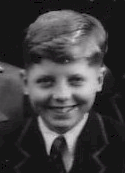
Michael, aged 12
|
Down between the hawthorn hedges we walked, through the
big iron gates at the top of Darley Park, opened that day by park keeper
Bill Bailey of the rotund stomach and twin spiked stick, down the slightly
curved pathway where Keep off the Grass signs protected the
immaculately cut lawn on the left and where sweeping swards rolled down to
the Brook and the River Derwent on the right. A slight autumn mist hung in
the morning air and the leaves on the trees had already changed to many hues
of orange, red and brown. Soon acorns would litter the ground under the
grand old oak trees and become ammunition in the hands of older boys
determined to pepper the new pupils with pin-points of pain.
|

The infamous 'Drop'. Click for full size.
Picture by Brian Skeldon |
We did not know
that – then. Nor did we know that at the back of the school, to one side of
the cobbled school yard, was a sheer drop, The Drop, of some six
feet, over which new boys would be pushed, unless they volunteered to jump.
It was all part of our initiation. We were the innocents. On arrival we were allocated to one of two forms, 1A
and 1Alpha (as Roger Finney reminds me).
At the end
of the first term, Christmas, there was a set of exams and term reports
which determined the selection thereafter and the boys were allocated to 1X
and 1A. Both Roger Finney and I were placed in 1X with a form master named
Mr. Smith - who left at the end of our first year. |
As the
years went by slight adjustments were made to promote or demote boys between
the X and A streams, as appropriate.
The first few days
Starting school was a whirl of unnerving experiences.
The older boys were always to be feared, for the age-old rites of bullying
had certainly not yet died out, let alone been crushed by the threat of
school discipline. Once in the third year boys could wear long trousers, so
the more senior boys looked so formidable – like grown men. They called us fags
and had us do menial chores, like carry their school bags through the park.
The fagging system, better known at the older public schools like Eton,
Harrow and Rugby, was almost dead. But not the era of prefects – boys from
the fifth and sixth years who helped in the running of the school
administering order amongst the rest of the boys on behalf of the staff.
I was placed in Form 1X, located in a cramped
classroom, second doorway on the left as you got to the top of the sweeping
staircase with its polished handrail. The desks were already old, of a
variety of styles and liberally engraved with names of previous occupants.
It was wise not to keep your books in these desks unless you could padlock
them shut. Facing
the backboard, the windows were on the left overlooking part of the Rose
Garden and a small copse that led down to the area where the tuck shop sat
near the swings, roundabout and see-saws.
As we slowly met each of the new masters we were given text books appropriate for the subject, and exercise books. The
slew of new exercise books held all the potential of a fresh snowfall when
no footmarks have yet despoiled its perfect appearance. My ambition was
always to keep each exercise book as neat as possible, and yet they quickly
became besmirched with crossings-out, ink blots (which plopped out of your
pen for no good reason except with some mind of their own to ruin your best
hopes) and wry comments from the teachers who did not appreciate your
inadequate scores.
The first task, however, was to take all your books
home and cover them. It basically didn’t matter what you used provided it
was not newspaper. And until I had seen the excellence with which other boys
covered their books I had not realized what an art form this could be. After
a while mine began to be covered with smart brown wrapping paper, carefully
folded and stuck with brown parcel tape, or glue. I tried as hard as I might
to write the subject name neatly on the front cover, but my handwriting
always looked as though it was the result of some wrestling match with a
giant spider. Some boys used wallpaper for covering – which appalled me. It
was so thick!
Mr. Topliss - my bęte noir
I was a boy of very sensitive disposition, with a
tendency to flush brightly at the least attention or embarrassment; if not
grin uncontrollably. So I can remember sitting towards the back of Form 1X
in the early days of French lessons with Mr. Topliss. I was always
suspicious of Mr. Topliss and was yet to have a heavy run-in with him in the
Fourth form. On this particular occasion he was asking boys questions in
typical teacherly fashion when he lighted upon me. I immediately blushed
deeply at being asked a question in front of the whole class and he probably
felt the glow as well as seeing it.
|
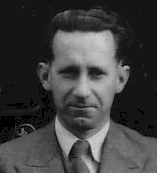
Mr. Topliss - my bęte noir |
“Why are you blushing, Buss?” Topliss
boomed across the room, only to see my red flush turn to an even deeper
crimson. I was totally incapable of controlling this, to my immense
personal shame; and his mention of it in class was therefore the more
humiliating. I liked French for a while, but Topliss was a problem. He
had a thin, pointed face, with a very blue jaw. He would have had to
sand his skin right off and start over again to get rid of the permanent
blue seven o’clock shadow. Once I knew he also taught German, I
immediately also knew, with all the exquisite intuition that only a
schoolboy can have, that he must have been a Nazi during the War! My
suspicions were confirmed; Topliss was to be regarded with great
caution! |
Enter
Robbo
Across the landing from Form 1X was the library, and to
the left, the room of Form 1A. We were soon to be introduced both to a
lecture on the right way to handle books and the formidable teacher in
charge of the library, Mr. Robinson - 'Robbo'. His reputation preceded him.
He was never to be trifled with, ever. His temper was as fragile as a fair
maiden's virginity in the hands of a band of marauding Visigoths. But
whereas virginity can only be lost once, tempers can be lost repeatedly.
The time came for our library initiation. We were
sitting round two large polished tables on which were scattered a number of
books when Robbo espied some miscreant wretch turning the pages of a book in
a potentially destructive fashion. His fingers were too close to the spine
of the book instead of at the outer edge. This held all the possibility of
inflicting damage as the page turned; a kink, a tear. Robbo's temper sprang
into action. Face going white, he wrenched the book away from the hapless
boy and with trembling voice said:
"You do not turn the pages of a book like this!" and
proceeded to mimic the boy's methodology, but going further, ripping the
page half out of the book. Now his hands were shaking with rage. "You turn
them like this." And with some difficulty he demonstrated the correct way,
turning the page from the outer edge, supporting it with the hand as he
flipped it over.
A boy muttered something under his breath. "Silence!"
Robbo bellowed. "Put your hands on your heads. All of you."
| We obeyed immediately. In the years to come
we would often sit with hands on heads as some vague kind of punishment.
Maybe it stopped us masturbating under the desk; who knows. Then another
boy spoke - perhaps just asking an innocent question. This time the
entire body of Robbo, now energized like a coiled spring, launched in
the direction of the boy. I think his name was Lander. He had dared to
speak. Robbo, out of control, lashed Lander over the head from side to
side, on and on, until I wondered if he would ever stop. Apart from
Lander's slight whimper, there was now total silence. Robbo had total
control and we had learnt how never to turn the pages of a book. |
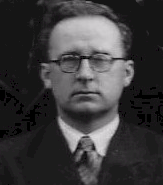
Mr. 'Robbo' Robinson |
I think I used the library after that, but probably not
when Robbo was in the room.
The sense of seniority, or pecking order, in the school
was probably matched by that at any other school in those days. In the first
year (11 & 12 yr old) you were definitely at the bottom of the pile. For the
second year boys, theirs was an opportunity to laud it over the new boys
with their new found power. By the third year you could be stuck in the
middle of tribal warfare, with two forms beneath you to tyrannize, if you
felt inclined, and bigger boys still above you. But a 15 year old is no
small match for a 16 or 17 year old, so the sense of warfare probably
diminished. It was a more prudent course of action. Nonetheless, there were
two times in the year when warfare usually broke out and in spite of teacher
protestations, the traditions persisted.
Acorn fights
Firstly – acorn fights. By the middle of the autumn
term Darley Park was awash with fallen acorns. Fresh from the tree, detached
from their fairy cup bases, they felt good in the hand - great pellets to
throw. The innocent new boys knew little about this until older boys,
pockets bulging with newly harvested acorns, suddenly charged. Ping! Zip!
Click! Ouch! - the acorns flew. And they hurt! If they caught you on the
neck, cheek, back of the head or worse, in the eye, you knew about it. Yet
the wound was seldom severe enough to inflict real damage. Boys can throw
fast and accurately, so when the swarm of erstwhile oaks trees buzzed around
your ears you ran. If you fell, you were just unlucky. When the new boys
were wiser they could prepare for defence and hold their own quite well. The
masters could see us engaging in acorn fights from the windows of the school
so we had to be careful to be far enough away not to be too recognizable.
Once the acorns dried out, becoming lighter, wrinkled
and brown, they lost their attraction. Let the squirrels have their way and
prepare for winter. Well so would we. And when it snowed we were ready.
Fun in the snow
Some pictures on this site show Darley Park in the
snow. It was an absolute paradise for sledding, sliding and snowballing. Now
a snowball can hurt far worse than an acorn. It’s bigger, heavier and can be
made very hard and icy. Everybody of all ages joined in snowball fights. And
as with the acorns, you got together in bands of your own year. If there was
time you staked out your area and rapidly made a whole pile of snowballs.
Then with pockets stuffed with spare ones, much like a tennis player puts
his second ball in his shorts, you charged on the other band of brothers.
There was less running away. The acorn fights had imbued certain tactics
into the newer boys, and sometimes they were emboldened by virtue of greater
number.
A group of fourth formers charged us first year boys.
Slipping and sliding we were soon all mixed up in fairly good-natured
snowballing when Giller fell. He was an older boy; a boy unfortunately, but
not inaptly, tagged with the nickname, Stank. Nobody liked him, and now we
had him at our mercy. Standing around him as he lay writhing on the snowy
ground trying to shield himself from harm we slammed those icy balls into
him; his neck, his head, his face – until our ammo was exhausted. There was
a certain delicious righting of all wrongs in the vengeance we wrought that
day. It felt good to know you landed a good one.
| And while we are on the subject of snow,
let’s deal with slides. Although the park for the most park was on an
incline, the ground levelled out near the brook and the river. In
addition, a flat walkway had been worn traversing the hill from the
school into the distance for the walk into town.
Both these flat areas were amenable to slides. The snow had thawed a
little and then frozen again. By a persistent process of running and
then sliding as best you could, the |
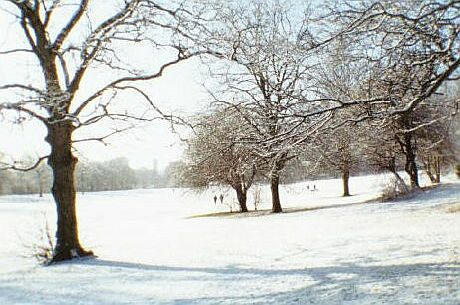
Darley Park in the snow. What a
place for sledging and snowballing! |
hard packed snow and ice glazed over and the slide
track grew longer and longer until it was easily the length of a cricket
pitch. The boys would line up and take it in turn to sprint until they hit
the ice and then shoot, legs astride, down the slide trying not to lose
balance. Arms out wide, a little bent at the waist to lower the centre of
gravity, this was an exhilarating way to wear out the soles of your shoes
such that the rest of the day was spent with wet feet and your parents had
to make a visit to the cobbler!
It was my turn to slide. For some reason I could not
fathom, each previous attempt had ended with my falling because I could not
prevent rotating clockwise to the point that the axis of my legs was now at
90 degrees to the direction of slide. This time I would blast my way
straight with sheer power. I sprinted faster than ever before, launched my
full momentum at the slide and flew across the ice. But the old rotation set
in again and all of a sudden I was over, crashing down with a sickening thud
on the solid ice, right eye first. I lay there, ignored by the rest of the
boys, stunned, shaken, hurt, winded. When I finally got up the eye was
completely closed with a huge swelling. I walked into school and although
several teachers saw my condition, did nothing. (Nowadays I would have been
rushed to the hospital and checked for concussion!). It was several days
before the swelling went. My mother was most alarmed when I arrived home. I
was always more cautious about ice slides thereafter.
 |
A little wiser -
March 15th, 2005 |
As the autumn months turned into the icy winter of 1954
the cold took its toll. I used to get up very early to deliver papers and
trudging miles in the snow before setting off for school. I remember getting
chilblains and applying Wintergreen. But at school a huge fire often blazed
in the majestic old fireplace in the main hall. We boys traipsed snow into
the school where it then thawed into pools which merged into wet floors and
stairs. One day I was coming down the main staircase when the Boss, who was
coming up, saw me looking at the falling snow through the window on the half
landing. He dryly remarked: " It's no good!" (There's a pun there if you say
it aloud.) Of course we would never commit the crime of sliding down the
banister rail - not if a teacher was around. Needless to say I was one of
many who polished the banisters regularly with my grey shorts and when
finally I was caught by The Boss it was just sheer misfortune that he
happened to have his cane in his hand at the time. And there and then, in
front of the blazing fire, I received my first swish across the backside.
I received a total of ten swished from Mr. Swaine - six
of which were for venting my dislike on Mr. Topliss (of which more later),
and two of which were for blowing up the river bank with home-made
explosives (also of which more later). But this I will vouch, he never, ever
beat me with malice or anger. And I never resented the corporal punishment,
though I certainly rued the pain.
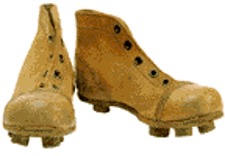
Hard leather; toecaps like domes of wood. |
With the passing of the snow we could get
back to football. Although there was a football field at the bottom of
the park, across the iron railing from the swings area, we boys trudged
down through Darley Village, through The Mill and down Haslams Lane
until a right turn took us into the playing fields which, if you kept on
walking, would turn you out into Chester Green. The changing rooms were
my idea of hell. Crushed into small, cold, brick built rooms with
concrete floors we there shed our uniforms for the football gear that we
de rigueur for all of us. |
As an Olympian my shirt was red, with a white
collar. The shorts were black and the boots insufferably uncomfortable. No
one had yet invented to malleable, close fitting boots of today. The toe
caps were like great domes of wood and leather and the leather studs
frequently fell off. I had no aptitude for the game, not realizing the ball
could be steered caressed with the side of the foot. All it ever did was
whack it with the point of the toe and I never knew where it would go! Not
surprisingly the other boys soon realized I had no idea and would put me
somewhere relatively safe like left back. If an opposing forward chased a
ball that was coming in my direction all I could hope to do was get there
first and kick it as hard as I could. I can still recall Jasper Stevens and
Hag James groaning in despair as the ball flew off in some useless
direction, generally to the advantage of the still attacking forward. At the
close of the game the clean arrangements were minimal so bands of sweaty,
smelly boys trudged off home or back to school. It was not surprising,
therefore, that when I discovered I was a very good runner, I switched to
cross country running!
At the rear of Darley Mansion, to the right of the
cinder surfaced driveway out to Abbey Yard and New Road was a single
storey, prefabricated building that served many functions. Here was the gym,
with its climbing bars, rough mats, vaulting box and horse. It was the
domain of Jim Lingard. Here was the Scout hut, where in the evenings Boss
Swaine exchanged his tweeds for the khaki uniform of the Scout Master and
drilled those of us who became scouts in the skills of survival.
Here also was the canteen – or dining room. Behind the
roll up screens, a bevy of ladies prepared our lunches; some of it cooked on
the premises and some of it shipped in from outside.
As I recall there was insufficient space for all of us
to be fed at one time, so we were divided in two sittings. We lined up
outside by form, backs to the school, under the control of whichever master
was on dinner duty. In these lines we would be expected to say grace
and then we were permitted to go in for dinner.
“For what we are about to receive, may the Lord make
is truly thankful.” I suppose it was some sort of cultural training that
would help us eventually appreciate the bounty of almighty God. At the time
it was an opportunity for messing about.
In this respect, Joe Hawksby often came in for a
hammering from the boys and I’m not sure he ever quite understood why.
Standing before us he would try to get us quiet. As the chatter subsided so
Joe spoke: “Say grace.”
A chorus from the boys: “GRACE!”
Joe’s face looked like a cloudy grey sky threatening
rain. “Will you cut it out.”
We knew the drill. Using the first two fingers of the
right hand as a pair of scissors we all mimed snipping motions. This made
Joe more mad, and we laughed.
“Just pipe down,” he roared above the disorder. But he
couldn’t win; not yet. For we were ready. Each of us held imaginary
recorders to our lips and twiddled away with our fingers as we slowly bent
over – piping down.
It could take a long time to get in for lunch when we
were in such a mood. Eventually the masters always won, no matter how much
we fooled around, because hunger got the better of us.
| We lined up by the serving hatches to get our food then
chose where to sit with our friends on the long, fold-away benches.
Occasionally a boy would drop a plate and the whole place erupted into
cheers. Sometimes the benches collapsed to even more general amusement,
though this could be nasty if you got a finger trapped under the bench
as four heavy boys crashed to the ground.
|
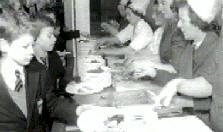
I admit it - this was not OUR school! |
I was
always surprised how picky the boys could be about school dinners. Hey – the
food was free (or did we pay?). In any event, it was nutritious, even if the
greens were generally overcooked, and meat was falling apart. It became my
policy to eat what was put before me and just get to like it. And I did.
Whether roast beef, pork or whale meat, it was good; though cold tongue
always gave me problems. Roast potatoes could be liberally salted and popped
in your trouser pocket for a little snack later. The desserts were
frequently baked chocolate sponge pudding with white sauce, or a yellow
sponge with a suggestion of apple at the bottom – and custard. We giggled at
spotted dick, but it was delicious. Whatever happened to such a magnificent
dish?
To be
continued ...
 |
With
gunpowder, treason and plot
A random reminiscence:
May 18th, 2002 |
There is something in the inquisitive nature of
boys that makes them want to try for real the things they learn in the
classroom, or, shall we say, the chemistry laboratory!
Naturally, there
have to be good reasons for taking school work so seriously. The
chemistry master, Fred Peake, taught us that mankind discovered how to
make iron and we faithfully drew little schematics of smelting plants in
our exercise books. But that did not induce us to rush out and build
blast furnaces in our back gardens; too much like hard work and no
immediate benefit from doing so. Imagine -
“Buss, what have
you got there in your schoolbag?” comes Peake’s voice over the merry
babble of young scientists figuring out the answers to a number of
chemical equations chalked up on the board.
“An ingot of pig
iron, Sir. I smelted it myself in the back yard!”
“Most
enterprising, Buss. And also most improbable, you lazy heap of
excrement!”
He would have been
right. And he probably also knew that if we could ape a school
experiment and make bangs, smells and otherwise wreak destruction we
could be counted on to do it. After all, what is the point of learning
how the Chinese invented gunpowder without then going home to mix a brew
yourself? Here is the formula.
THE RECIPE FOR GUNPOWDER
Of course you
have to contrive not to try and buy all the ingredients from the same
chemist or he gets suspicious. All powders have to be ground up finely -
though soot from the chimney is ready to go.
You mix the carbon and sulphur first then take some care while adding
the saltpetre. Kids blow their hands off at this stage if they are
smoking dope at the same time.
Alf Baker had a
source of spent 303 brass cartridges; we never asked. I stuffed them
with gunpowder, bent the tops over and nipped them tight to keep
the powder in. Our bombs were ready.
Back in the 1950’s
we had not yet got fired up with the sort of idealism that would have
seen us blowing up a statue of the king in the town square as an
essential mission in nascent republicanism. First you needed to test
your bomb in a sand bagged environment. But in spite of the fact that
these were not too hard to find in days when you could still play in air
raid shelters in the park, our first Bikini Atoll would be the banks of
the River Derwent where it casually wandered through the bottom of our
school grounds. I remember that Roger Finney was in on this experiment.
Alf Baker and Wilb were in the know, and Wilb was able to recall the
details when I met with him in November 2001.
We dug out a small
cavity in the sloping mud bank of the river, perhaps a foot down from
the overhanging grass and dandelions. The cave was about 9” square and
as deep. The brass cartridge was pushed into the firm clay at the back
of the cavity with enough space underneath to stand a small candle.
Light the candle, retreat about eight feet and lie flat on the ground.
You want to be close to maximize the excitement when the bomb goes off
but not close enough to get hurt. The first time you let off such a
piece of ordnance you do not know how great a bang you will get, so you
play safe.
The explosion,
when it came, was pretty impressive. Digging around in the collapsed mud
cave we pulled out the twisted shrapnel, shored up the walls and went
for round number two. I guess we probably blew up the river bank about
three times before the school bell tolled and we had to run back to
class.
-
Get the fuse
burning then drop them quickly into a dustbin (trashcan). This gives a good blast
quite capable of blowing off the lid.
-
Tie the banger
under the head of the butcher’s chrysanthemums, light the touch paper
and run. The decapitation works a treat and the man’s wrath is intense.
-
Embed the banger
into a small ball of clay, wait till the fuse is burning then drop it in
the stream. Underwater explosions are pretty neat and the frogs hated
it.
-
Toss bangers into the local
parish church just after choir practice when the organist and choir
mistress are still there. (This sacrilegious act led to my leaving the
Church if England forever!)
-
Tie the banger on
to
a rocket with the two touch papers touching. If you are lucky you
can then get the banger to explode while the rocket is airborne. I found
this a technical challenge which seldom worked well because the rocket
might not bear the extra weight or the timing was simply impossible to
predict.
|
[Back to Central] [Home
page] |

